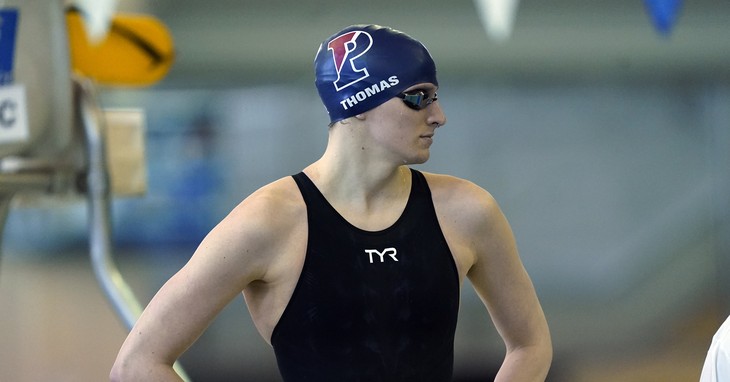Controversial transgender swimming star Lia Thomas spoke out Tuesday on ABC’s “Good Morning America,” saying trans people don’t pose a threat to women’s sports. “I knew there would be scrutiny against me if I competed as a woman,” she said. “I was prepared for that but I also don’t need anybody’s permission to be myself and do the sport I love.”
Thomas competed for three years on the men’s swim team at the University of Pennsylvania, with middling results. She began hormone replacement therapy at the end of her sophomore year and joined the women’s team for her senior year. Not surprisingly, she went on to smash numerous records and win an NCCA title in the 500-yard freestyle final.
[embedded content]
Now that her college swimming career has ended, Thomas intends to keep going, telling interviewer Juju Chang:
I intend to keep swimming. It’s been a goal of mine to swim at Olympic trials for a very long time, and I would love to see that through.
When Thomas says in the first quote of this article that she doesn’t “need anybody’s permission,” she might want to re-think that one. She will, in fact, need the permission of the International Olympic Committee, which has constantly-changing, complicated rules and regulations regarding transgenders competing in the games. (For the moment, the IOC dictates that transgender policies are determined by each individual sport. That’s leadership for you, folks.)
Thomas has faced immense backlash over what many see as her unfair advantage. (I’m trying to be objective here, but really, who with a straight face can say she doesn’t have an obvious physical advantage? C’mon, man.) Her teammates, long silent, slowly started speaking out.
Thomas is unfazed by a critical letter signed by 16 teammates that was sent to school and Ivy League officials. When asked to respond, Thomas doesn’t sound like she gives a rip about her teammates or all the female athletes she’s impacted. She flatly claims, “Trans women are not a threat to women’s sports.” She goes on to charge that if you don’t believe biological males should be competing against females, then you don’t support trans people:
You can’t go halfway and be, like, “I support trans women and trans people, but only to a certain point.” Where if you support trans women as women they’ve met all the NCAA requirements, then I don’t know if you can really say something like that.
READ RELATED: Out-of-Control Deficit Spending Is Generational Theft

She also claims that trans people don’t transition for competitive advantage and that it’s “not something that ever factors into our decisions.” Whatever her intent may be, it’s still clear she has an edge.
According to Dr. Michael Joyner of the Mayo Clinic, who appeared on the same “GMA” episode:
There is going to be some loss to skeletal muscle mass, there is going to be some increase in body fat — those would be the two most obvious things. But things like hand size, lung size, feet size — that’s not going to change much. And of course, because as you know, swimming, it’s such an intense sport and people train so hard, that she is going to continue to have a significant exercise stimulus to those skeletal muscles.
Once again, Lia Thomas is not impressed:
I’m not a medical expert, but there’s a lot of variation among cis female athletes. There are cis women who are very tall and very muscular and have more testosterone than another cis woman, and should that then also disqualify them?
Seriously, Lia? Comparing strong tall women to biological men who have had hormone replacement therapy is flat-out preposterous. Thomas then complains that if she were not allowed to compete against women, she would be deprived:
“In addition to not allowing the full athletic experience, that’s incredibly othering to trans people who already face immense discrimination in other parts of our lives,” she said. “To then again have this discrimination in sports and be, like, ‘Oh, OK, you can swim, but only over there, like in that lane.’ It’s very othering.”
A lot of people have wondered what’s been going on in Thomas’ head since the controversy began because she has not spoken out much. I was expecting to have some sympathy for her–she’s a human being after all, and there’s clearly a lot going on in that young brain. Now, she has spoken, and to me, she sounded cold, dismissive, and privileged. I assumed she would acknowledge that the issue was complex, but no, to her it’s cut and dried, black and white, clear as day. I have nothing against trans people, and it’s not transphobic to acknowledge that biological men are stronger and bigger than biological women; it’s biology. Does she ever offer an ounce of sympathy for the other girls whose dreams she dashed? Nope.
She seemed mostly to think of no one other than herself.
Source:





